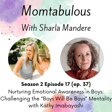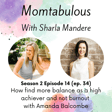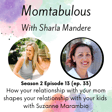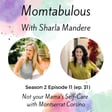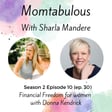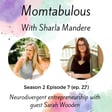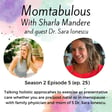Become a Creator today!Start creating today - Share your story with the world!
Start for free
00:00:00
00:00:01

Doulas, Diastasis, pregnancy & post-pardum - oh my!
Today I speak with the amazing Amy Owen, doula and pre/postnatal fitness expert. We talk about the ways your body changes, diastasis recti (and what that is!), how to prep your body for labor, how to heal after, and how to find the right trainer if you want one to help you.
A great episode whether you're having your first baby, or are years out from having kids!
Find her here - https://amyowenyoga.com/
Thinking of starting your own podcast? Zencastr has made it so easy for me! Use my special link sharlam to save 30% off your first month of any zencastr paid plan! Click here to get started https://zen.ai/5w4iw6s8Isq8iujju1Yq4A
Transcript
Introduction of Amy Owen
00:00:15
Speaker
I'm your host, Sharla Mander. And with me today is Amy Owen. And Amy is a certified birth doula and educator and prenatal yoga instructor committed to supporting women throughout pregnancy, birth and motherhood. Amy believes there is no right or wrong way to give birth only
Amy's Mission in Maternal Support
00:00:34
Speaker
your way. And her mission is for women to be fully supported and prepared
00:00:38
Speaker
both for the hard feet of labor and the transition to motherhood.
Empowering Women with 'Birth Boss'
00:00:42
Speaker
She's the author of the upcoming book, Birth Boss, how to take care of your birthing experience. Oh my God, I love this so much. Welcome, Amy. Thanks, Sharla. It's so good to be here. And this is such an important conversation to
Understanding Diastasis Recti
00:00:55
Speaker
have. We were just talking about, after I had my kids, something called diastasis recti, and we'll get into this later in the conversation, but I didn't know it was my first.
00:01:05
Speaker
My second, I was starting to get into prenatal fitness and I was like, oh. And I have friends that have four and five year olds and they still have it and didn't know. And they're like, oh man, that's why so much is going on. So this is such an important topic because I think the thing, there are so many things that people don't tell you about.
00:01:26
Speaker
when you're pregnant having babies and after you have the babies that you go, why did nobody tell me that could happen? Right? And so this is a really good, good conversation to have. There's anyone out there listening that is about to have a baby, thinking of having a baby, just had a baby, or even has like a kindergartner, you know, that maybe
00:01:46
Speaker
maybe you're still dealing with some of the aftermath of the, it's trauma on your body, right? Yeah. And it's a big mystery because there is no one like telltale guide out there. And so a lot of times it is kind of piecemealing together what you need and what's going on for you. And unfortunately a lot of the stuff like diastasis recti is not spoken about. Yeah.
Exercise Benefits During Pregnancy
00:02:10
Speaker
So let's start with pregnancy.
00:02:13
Speaker
We've done the deed, whatever it is. We lucked out. The stork came down. We're pregnant. I hear all the time like they go, should pregnant moms work out? You remember back in the 1800s when we obviously were alive and people were like, oh, you're with child. Just lay in bed. They were just supposed to just lay around all day and not do anything, but we've learned that that's actually not.
00:02:40
Speaker
not good. So should pregnant moms work out? Absolutely. And this is how I came to teach prenatal yoga because when I was pregnant, I went to a yoga class and they were like,
00:02:55
Speaker
don't do anything, don't do down dog, don't do anything but sit there and maybe lift an arm up. And as somebody who was super active and had a pretty big yoga practice before that, I didn't feel like I was getting the benefits and intuitively I felt like my body could and should do more.
Adapting Exercise Routines for Safety
00:03:15
Speaker
And fortunately now, this was 26 years ago, fortunately now,
00:03:19
Speaker
The consensus is that you should absolutely be exercising and being active during your pregnancy, but what types of exercise it is specific to pregnancy and some forms of exercise are better than others.
00:03:35
Speaker
Yeah. And by trimester two, right? I remember just like you're saying with my oldest who's now 14 when I was pregnant with her, I had bought a pregnancy DVD and I remember being like, okay, I'm pregnant. I'm not dying. Like this is, I can, it was so, it was so gentle looking back. I'm like, oh, it might've been a trimester three type video. And I was in trimester one where I was a runner and I was, you know, I was working out a lot and
00:04:04
Speaker
It was like, I just felt like, like you were saying intuitively, I'm capable of so much more. And all you're telling me to do is basically breathe. Where I'm looking back going, oh, it was probably more like a trimester three video that I bought. It just was labeled as like pregnancy workout.
00:04:20
Speaker
Yeah, and the first trimester is very different from the third trimester. Absolutely. And I always say like, we're not handicapped when we're pregnant. We have limitations and we need to work within those limitations, but it doesn't mean that we can't do nothing.
00:04:38
Speaker
you know, or can't do anything. Yeah. So definitely like trimester one, right? Especially when you got some morning sickness going on, you've got, you know, maybe you're, you're like what is happening, but you don't even really even look pregnant yet. Right. At least for most of the way through it in general, right? Someone who maybe has been active before, if you haven't been active, you don't want to go ahead and start running. Right. But if you have been an active person, what in general might be something that they could look
00:05:08
Speaker
to do. Yeah, the rule of thumb is whatever you're doing before, you can continue to do now. What I will say is that a lot of women come to me in their second trimester and they go, oh God, I feel so bad. I have not worked out at all in my first trimester. Like I know I'm behind. I know I should have been working out. I'm like, actually no.
00:05:31
Speaker
you should have been listening to your body and your body was zapping you of all of your energy you were nauseous and so no you shouldn't do anything that you don't feel like you can do if you're feeling that way so and the other piece is that in the first trimester
00:05:52
Speaker
I mean, sadly one out of five pregnancies is not viable after the first trimester. So I do think it is important to err on the side of caution in that first trimester and not introduce any new types of exercise or do anything that you don't have the energy for.
00:06:10
Speaker
It's a tricky time, so we want to be careful. Like, you think about, all right, I've got a seed laying here and I need to give it its exact amount of water and air and sunshine to grow and to bloom and to really take off. And so it's okay and probably appropriate to do less in that first trimester.
00:06:34
Speaker
Now you get to the second trimester and then women start typically feeling really good and have their energy back or the majority of their energy back and they're ready to get back into some kind of exercise routine. And so that's really when women are their strongest in pregnancy. Yeah, for sure. I remember, I remember too, like I would tell clients, you know, I taught pre and postnatal fitness as well for years and I would tell them like,
00:07:01
Speaker
If you had the flu and you were nauseous or food poisoning and you were nauseous, you wouldn't push yourself into a workout. Especially if it's like your second or third baby, you've got a toddler running around, you're sick, you're waking up multiple times in the night still, you're exhausted, you're just all out of sorts. No, please don't go out for a run.
00:07:25
Speaker
Yeah and you want to use like there's a reason that you're fatigued and it's because your body is using all of its energy to bring this little seed into a full-fledged human being. You know that that energy output isn't tremendous so we actually don't even want to rob you know or place our energy elsewhere. We want it to go into that process that first trimester.
00:07:49
Speaker
Yeah. And what are things that they should avoid? Like you had said that yoga instructor said, don't do downward dog 26 years ago is something like downward, like it's upside. I've heard people say like, I'm not supposed to go upside down. Like no handstandy things, no downward dog.
00:08:05
Speaker
Yeah, I think it's disrupting. I think any like deep twists or core work, you know, or twisting and kind of compressing the belly is not good. Like you want to think about your core as, you know, your uterus is there. This is where all of the growth and development is happening. So we want to leave that container undisturbed. So any big twists, any big contractions of the core
00:08:32
Speaker
is gonna maybe potentially disrupt that area. And so I say like back off of those types of movements for sure. If you've been running before and you feel good running and you've got the energy, then you can run. If you're doing a yoga practice specifically, I will have my women not do deep twists or deep court work. What about like hot yoga?
00:09:02
Speaker
no hot yoga. So what we know about hot yoga is that when we're pregnant, our fetus cannot regulate their own body temperature. So our body temperature is what, what their body temperature is. So we don't want to bring the body temperature up, you know, above. And I don't know what the exact temperature is. You may, Sharla,
00:09:26
Speaker
But like a hot yoga class is a hundred and I think three. Yeah, that is that is too high. I'm where the heat is like 110. And that's like way too high, way too high. So if you're you know, if you're really sweating, if you are feeling lightheaded and dizzy,
00:09:48
Speaker
the amount of oxygen that's getting to your baby is being limited. And that heat could potentially, if you're overheated, your baby's overheated. So definitely no hot yoga. And that goes for the whole pregnancy. And that's why they say no hot tubs, hot baths, same thing.
00:10:06
Speaker
Yeah, yeah. So what could they do, right? Listen to your body, right? But in general, what exercises should we be focusing on to prepare us for this labor that, you know, could last God knows how long?
Preparing for Labor with Strength
00:10:23
Speaker
Yeah. So what I think is really cool about
00:10:28
Speaker
exercise and the way to approach it in pregnancy is not only exercise to help with the typical aches and pains while you're pregnant, but to know that you could use some of this exercise as prep work
00:10:43
Speaker
for childbirth. So I would say like if you were going to go out and run a 26.2 mile marathon, would you just wake up one morning and put on your running shoes and go out and do it? No.
00:10:58
Speaker
And labor requires a tremendous amount of strength and stamina. And so it requires conditioning and requires strengthening. So the sooner that you can kind of do that throughout your pregnancy and get that strength and get that stamina, the
00:11:19
Speaker
more prepared you are going to be in that birth space because the truth is every woman can give birth, but labor is long. It's not the discomfort and the pain, like everyone talks all about kind of the pain of labor and how intense contractions can be, but I think it's the stamina. I think like any woman can like
00:11:43
Speaker
Labor for two hours or four hours, which is a typical right marathon But when you're getting into eight hours twelve hours, you know Then you're really having to dig deep with in terms of stamina and strength And so if you can build that prepare for that earlier on you're gonna be setting yourself up for success So, how do they build stamina?
00:12:07
Speaker
The best forms of exercise are yoga, which is what I teach, Pilates, walking, swimming, like low impact, light weights, band work are all really great. You're not gonna wanna do super heavy weights.
00:12:25
Speaker
Women, if they're runners again, if they were running before, you can run to a certain point. But once that baby's weight gets pretty heavy, you're putting a lot of stress on those ligaments that are already soft and relaxing and loose because of the relax and hormone in your body. So really low impact. Exercise is going to be the best for you.
00:12:50
Speaker
And postnatal too,
Diastasis Recti: Self-Test and Recovery
00:12:51
Speaker
right? That relax and stays in your body for a good long time after, which is good. And, you know, and detrimental. So, so postnatal, like, let's, let's talk. We mentioned in the beginning about potato, potato, right? Diastasis, recti. Some people say diastasis. Some people say it, you know, it's potato, potato, potato, potato, right? Um, so how, like, what is that?
00:13:20
Speaker
How does someone know that they have it? Can you do a test on yourself? I know the answer is to all these, but let's explain it. What can we do to fix that so that we can get back to? I want to get my abs back. I want my body back. Not going to happen if you have diastase recti. So what is that? And what can we do?
00:13:41
Speaker
Yeah, so it's the separation of the abdominal wall. It's the rectus abdominis, which is a muscle with two parts that runs vertically from the sternum to the pubic bone, right? And the sections come together at the midline, like a network of connective tissue, and lay on top of other core muscles, namely the obliques,
00:14:05
Speaker
and the transverse abdominis which in those wrap around the sides of the body and kind of provide a sort of like internal corset. So the rectus abdominis is the the abdominal muscle that actually separates and one of the tests is and for women like if you lay on your back
00:14:26
Speaker
And you kind of put fingers, so diastasis erecti, it's usually two to three fingers. So if you kind of put fingers, you lay on your back and you almost like tuck your chin to your chest and kind of curl in, almost like you're going to do a crunch, like a little bit of a crunching.
00:14:46
Speaker
bicycle curl you'll kind of crunch forward and you may see this like dome or this bulge or this like kind of pooch in the center and that's how you know that you have it and you'll feel there's actually a gap with your fingers between the two walls and so two to three fingers or more than it might indicate that you have this.
00:15:11
Speaker
Yeah. And so I'm pretty sure I did have that, have that with my first and I didn't know about it. And with my second, I was getting in their pre and postnatal fitness and I, she was like four months old and I, I did that test on myself and I have a four finger width separation, which I think is a bit subjective, right? If you're like, have like a larger man testing you, it might be three fingers. I'm small. Mine was four, you know, it could be a bit subjective, right? But you're looking for that. It was like, I could stick my whole hand in all the way in. And I was like,
00:15:40
Speaker
whoa, not expected. Okay, so let's get to work on fixing that. Right. And that was four months after, you know, it was still so I'm sure it was even separated more. Right. It's really, it's really common in women and a lot of women don't even know about it. These are one of those things in pregnancy that you go, nobody told me that that could happen. But I taught when I talk about I talk about like, you know, when you see the the pictures of like the bodybuilder people and the really cut people that six pack abs
00:16:10
Speaker
that's what we're talking about. So those, when they separate, if you had those six-pack still, you would see those abs way off on the side, right? Kind of almost where the, correct. It's almost like a zipper where they're like, if you unzip the zipper, they kind of pull to the side and then you have this gap. Yeah, yeah. And so what can be done about it at home or with a trainer or someone, right, to fix that on your own?
00:16:39
Speaker
Yeah, so first, I mean, the first thing is I'd say go to your doctor and check in, see if you in fact have it, because every woman has a little bit of separation and it can naturally go back together. It may just take a little bit of time, but if you know that you have it, and even if you don't, these exercises are beneficial for everyone postpartum, but I would say to start doing some specific
00:17:06
Speaker
core exercises that will help with it. You can go to physical therapy, you can go to a postnatal certified trainer like myself and you, Sharla, and start to do some of these exercises. They're not going to be, when we say strengthening the core, they're not going to be like one
00:17:27
Speaker
Exercise to avoid are crunches. That's like a major, you know dr No, no, like you don't want to start to crunch that's gonna actually make it exasperated make them worse So you're gonna want to work on on Exercises that focus on the obliques and the transverse abdominis which I was talking about which those are the ones that are the beneath the rectus abdominis that wrap around your
00:17:56
Speaker
your core, your whole core into your back and kind of those corset muscles. So those are the ones that we're going to really want to target. Yeah. Yeah. I love that analogy. I say that all the time when I'm in my classes, I'm teaching, we're working the transverse and like it's the corset muscle.
00:18:11
Speaker
We're cinching it in. And there's lots of breathing too,
Importance of Informed Trainers
00:18:17
Speaker
right? Where you can breathe and feel that zipper, like you're saying, zipping back together. Just putting that zipper back in place.
00:18:27
Speaker
Yeah. And I feel like it's really important. A lot of women don't know about diastasis recti and no shade on male trainers, but in general, a male trainer will never have heard of it. And I've worked with male trainers who trained NBA basketball players and NFL football players. And then a woman comes in who's had a baby and they're like,
00:18:47
Speaker
What? I know, I don't know what that is. And I'm like, I got you. Come over to me. I haven't trained NFL players, but I work with moms, right? And it's just like, no shade on them. They've trained athletes, major athletes, but they, men will never understand.
00:19:05
Speaker
Well, I do think shame on them because they're trainers and they should be training women and men and they should understand women's anatomy and women's, you know, different phases of life as much as men's personally, or they should cater their practice to this is what I do. I do men's sports athletes. Yeah.
00:19:26
Speaker
For sure. Women are going, and I see this a lot too, women are going to trainers assuming that they know how to address these issues and the fact that they don't is a problem.
00:19:36
Speaker
Yeah. Yeah. Well, are they just don't, they don't think about it because it's not something they've ever experienced, right? This, you know, there'll be a guy trainer who's like, I'll kick your ass and I'll do this and we'll, we'll work hard and you'll sweat and you'll build muscle. And you know, women go, okay, yes, I want to, I want to be toned and I want to sweat and I want to do this workout and that'd be great. But hold on. Because especially if you've had a baby, this might not be the right thing for you right now.
00:20:01
Speaker
And then we can get you there, right? Okay, so what we're talking about too is like a mental state during exercise of giving yourself some grace too,
Starting Postpartum Fitness with Compassion
00:20:11
Speaker
right? You've had this baby, you're six weeks out, you've been cleared by your OB, you can work out again.
00:20:19
Speaker
Please do not come to a class or workout with a trainer and start busting out burpees, right? This is not when you go to that dude at the gym. This is when you go to someone who is trained in postnatal because
00:20:34
Speaker
I've had so many women come to my classes and like your brain will say, I can do this. We did it before. I can do it. The baby's out. I'm back. We can do it. And your body goes, Oh no, no, no, no, no, no, no. We are not ready. Right? So how do we, like we got to give ourselves grace, but how do we ease ourself back into working out after? Yeah.
00:21:04
Speaker
I think that's such a good point, Charla, because I know for myself, with my three kids, I just felt like, oh, I should be able to just get back to my old self. And like, I'm a tough woman, I can dig deep, I can do this. And I wanted to be as like normal as possible. And I think when we have the mindset of, oh, I'm not the same, and I don't need to be the same, and it's not a mark against me,
00:21:33
Speaker
that I'm not the same, it immediately starts to take pressure off ourselves. Like just to have a lot of self-compassion for ourselves, to know that like we're not the same and we shouldn't expect to be the same. And so that right there and to like trust your body, listen to your body, start small, keep it simple and build from there. They're like building blocks.
00:21:59
Speaker
And that first year, it's gonna feel different for every woman when they're kind of ready to get back.
00:22:08
Speaker
into movement. And in the beginning, it may just be like little walks and walking with their baby and having a smaller or shorter routine or simple routine. In the beginning, I just worked with a woman who was a major athlete, college athlete, major triathlete, has run
00:22:31
Speaker
you know, over, I think over 12 marathons in her life and she's only 30. Um, and she was amazed at how little she needed to do to feel better and how if she tried to do more, it just didn't work. Yeah. Yeah. Yeah. Okay.
00:22:54
Speaker
You are not a marathon runner right now. You'll get back to it if you want to. But it doesn't happen overnight. It doesn't happen quickly. And I think the more pressure that we take off ourselves, the more time we give ourselves. And just starting off really small and simply is really the best. Same thing. Yeah, exactly. And I had a client who was an Olympic rower.
00:23:19
Speaker
And she had like end of the Olympics and everything. And she had this baby and she showed up at this class of mine. And she was like, I'm an Olympian. I can do. And I was like, you just had a baby. It doesn't care if you were an Olympian or not. You're not ready for this. And she was kind of floored. Same thing. She was like, I still feel like I got a good workout. And I did probably a quarter of what, but the focus on the intention with the movement was like, right? Really important.
00:23:48
Speaker
And I think too, like if they're just had a baby and say you like joined a gym, right? And you go to a class at the gym, like,
00:23:55
Speaker
As the trainer, I would prefer for you to come up to me before the class privately and just say, Hey, I just had a baby six, seven weeks ago. This is my first class back or what I've been back at the gym for a week. I've been, you know, I'm new. This is my first class with you, but I'm my fourth class back or whatever. Just wanted to give you the heads up. So if, if I don't do something, you know, I, people tell me all the time, like I've got a knee injury or a shoulder thing. So if I'm not doing what you ask,
00:24:24
Speaker
It's not personal. And I'm like, oh my God, no. A, thank you for telling me. This information, the trainer needs to know. Because if I've got 20 something people in a fitness class, I don't know who has ABCD injury unless you come tell me. I can't check into the end because it'd be kind of offensive if I walked up to every single person like, hi, welcome. Do you have any injuries I need to know about? Right?
00:24:47
Speaker
If you come to me privately and tell me, but also a good trainer and I always, a good trainer will always offer modifications of like a low impact option, a medium, and then the high impact option for the people that are there that are ready that it feels good for today and it might not feel good every day, but that's what I say. But I always offer modifications and I tell them like, don't be afraid to take the mod, please take the mod today because you need to build back into it. And then I've got on my radar,
00:25:15
Speaker
a modification that I can do for that specific person and they won't even know it's for them, right? Like I'm redoing my class and my brain for that person with the shoulder injury, the knee injury, the woman just coming back from having a baby to go, okay, okay, this modification, I need to modify in this way. And then I'm watching, did she take that mod?
00:25:36
Speaker
Yes. Right. And if she didn't, I'm walking over there very privately. It's okay to take the modification down and I cover my microphone, right? Like don't be afraid. It's good. This is the, this one's for you. You know, wink, wink, nudge, nudge, you know? So I would say to like, right. Don't you appreciate if you teach a class, like someone comes to you privately before and it doesn't, it's not in front of the class. Doesn't mean big deal. Right. But just tell the instructor, this is where I'm at because they need to know.
00:26:06
Speaker
Yeah, don't shortchange yourself, you know, by not speaking up because it's true. Like if someone lets me know that, let's say, I mean, some people come to a regular yoga class and they're in their first trimester, you know, and they'll let me know to the side, Oh, I'm newly pregnant or somebody's postnatal. If I know that I'm going to do exactly what you said. I'm going to make sure.
00:26:32
Speaker
that I'm offering in that class, exercise is specific to that person that I know everyone's going to benefit from and no one's going to know. But it's like, oh, I'm going to do these three things or these five things, you know, whatever it is so that this person really can get the benefit from this class and everyone else is also going to benefit, no doubt. Yeah.
00:26:53
Speaker
Yeah, I mean, especially if you're in a group fitness setting, right? If you're not one-on-one with a trainer, if you're coming into a group fitness setting, if it's yoga, if it's like a sculpting class or even a spin class, right? God, taking a cycle class after having a baby is like going to be out. So maybe you need to wait more than six weeks for that one, right? I tell people, okay, well, did you bring a seat cover? A lot of pressure. Yeah, it's a lot of pressure down there. Right?
00:27:20
Speaker
You know, I've got, in my classes, like 22-year-olds and 80-year-olds. And I've got 22-year-olds that are, you know, have been in college classes and they haven't worked out and now they're back. And I've got 80-year-old women doing burpees. And at the same ticket, I've got 70-something-year-old women with a shoulder injury and the knee injury. And they're having them, you know, and then I've got women in their 30s and 40s and 50s who are, you know, taking mods or not, you know, doing the height, you know. So everybody's at a different place, pregnant or not.
00:27:50
Speaker
But coming back after pregnancy, I think it's easy to think, well, I used to be that person doing all the highest impact moves, and I've got to look just like the instructor, but you shouldn't.
00:28:02
Speaker
And I don't like shoulds, but in that case, you absolutely should not try to do what the instructor is doing. And that's where I'll do the modification a lot as the instructor, just to give people permission, you know, to do it. How does someone who just like had a baby kind of find the right trainer?
Choosing a Certified Postnatal Trainer
00:28:20
Speaker
Like we've talked about, like, right? You need to make sure someone is certified in pre and postnatal. Is there anything else? Like what questions could they ask?
00:28:30
Speaker
Yeah, I think they absolutely should be trained in pre and or postnatal. I think depending on your budget, if you can hire a private trainer to work with you one on one, that's going to be the creme de la creme because they're going to be able to meet your needs wherever you're at. I think the second thing is
00:28:51
Speaker
to take public classes from at a gym, at a fitness center, but to ensure that the trainer is well-equipped and versatile and educated and pre and post. And then the last one is purchasing exercise videos or getting them for free on YouTube or somewhere else, but looking for those specialists in this specific field.
00:29:21
Speaker
for that, but there's a wide range and I think, you know, there's great content on YouTube. You know, there's PT, instructors, there's Pilates, there's yoga, there's, but I would definitely look for the pre-natal specialist or post-natal. And, you know, the other thing is like,
00:29:37
Speaker
Hiring a private trainer is great because you're working on your things, but going to public classes can be really nice because you can find yourself a community. You can find yourself, if you're going to post-natal class or a baby and me class, you're going to meet other moms who are going through the same thing at the same time. You might be at all different, somewhat different stages.
00:29:58
Speaker
how nice to have a community because the truth is after you have a baby it can feel a little isolating and it's important to feel connection and build community at that time with other moms. I would say really look for that as well is super important.
Community and Accountability in Fitness
00:30:17
Speaker
Yeah, that community is life-giving, right? When you're around other moms who are in the same kind of phase of motherhood, that is life-giving for sure. Yes. Your mother-in-law may be wonderful, but she may not be the best community for you.
00:30:34
Speaker
She hasn't had to raise a baby in a long time, right? Yeah. And even friends that had a baby two years ago. It's different than somebody who's really in the span with you. It makes it more fun to do these types of classes with women. It's also nice for accountability. If you could find a workout buddy, someone that you could do some of these classes with or do a semi-private with a trainer together.
00:31:04
Speaker
can be a really nice way to make sure you show up.
00:31:08
Speaker
you know, do the self care and the exercises that you need. And it's just more fun. Like the truth is like you can get free classes on YouTube, but you're going to be at home alone, which, you know, you may already be typically with a newborn. So if you have a way to get out of your house, especially that's what I love about those baby and me classes, it doesn't require a babysitter. You know, you can take your baby with you, you can meet people and you can, you know, get
00:31:38
Speaker
the physical benefit. Yeah, for sure. With my first, I was so isolated and that it was definitely a factor in my postpartum depression. With my second, I made sure I found that community. My husband was like, you are a different mom. And I was like, yeah. And just finding that buddy and let me tell you, there ain't no workout like pushing a stroller up a hill.
00:32:00
Speaker
Especially if you got the double with like a toddler and a baby and the car seat on it and the snacks and the diaper bag and the, I mean, that is a heavy stroller. Pushing that up the hill.
00:32:15
Speaker
It's not just walking and getting your 10,000 steps in, but you're going to get upper body movement, you're going to get core strength, all the things. Yeah, for
Support Through Prenatal Yoga
00:32:24
Speaker
sure. So you have a freebie that you are offering. Tell us about that real quick.
00:32:31
Speaker
Yeah, so I, in addition to being a doula, and I'm also a prenatal yoga instructor and post, and on my website, I have some free prerecorded on demand
00:32:47
Speaker
prenatal yoga classes, which are also great for postnatal. And they're not specific to postnatal, but they work great for postnatal. And I wanted to gift your audience one of those offerings, one of those videos. So if you go on my site, you can pick which one you want. I've given Charla a code that you can pop in when trying to purchase it. There'll be a little discount code box, put it in there, and then it's yours for free, and it never expires.
00:33:14
Speaker
Yes. And that's on-demand-gift, right? Yes. And we'll put it down below too, but on-demand-gift at amioanyoga.com. Yes. Right. I had to think about that one. Yeah. So amioanyoga.com.
00:33:34
Speaker
on-demand gift would be, and again, I'll link it all below, but this was amazing. This was so much great information and that's such a great freebie. Thank you, Amy. Grab a friend and do the freebie together. Do the workout, right? Grab a mom friend. Exactly. Let the babies crawl around the floor or play with the thingy and put them in the crib and do the workout together.
00:34:00
Speaker
Thank you so much. This was such great information. And I know that there are more questions women have. So please feel free to reach out with questions to Amy or myself. And if I don't know, I will forward the question on to Amy. And thank you for watching. And I appreciate you being here, Amy. This was great. Thank you. Thank you so much, Carla. Pleasure to be here. And we'll see you in the next episode.
Podcasting with Zencaster Discount
00:34:26
Speaker
Thinking of starting your own podcast? Consider using Zencaster. That's how I record. It's made the whole process so easy for me, from recording to sharing the link with my guests who don't need to download a thing, and then sending it out to multiple platforms in such an easy way. All you need to do is go to zencaster.com slash pricing and use my code charlottem, S-H-A-R-L-A,
00:34:56
Speaker
M, as in Mander, and you'll get 30% off your first month of any Zencaster-paid plan. Start now. It's time to share your story.

